My News and Reviews
All right! Another week! And what sorts of goodies did I have for you all? First off was my review for Spice & Wolf, Volume 4. Isuna Hasekura’s light novel that is. (It also happens to be the 100th review posted on Experiments in Manga!) I haven’t delved into the manga version because I’m happily content with the novels. I also posted a review for Natsume Sōseki final novel and masterpiece Kokoro. I’ve been meaning to read it for over a year now. Fortunately, it was chosen as the September/October 2011 selection for the Japanese Literature Book Group. I’d also like to mention a review for Diana Wynne Jones’ novel Howl’s Moving Castle that I posted over on my book review site Experiments in Reading. If you’ve only seen the anime adaptation, which I have a quick take for below, you’re missing out on some great stuff.
And, as promised, a few interesting things that I’ve recently come across online. I don’t know much about the dance performance TeZukA other than the fact that I would really like to see it. Helen McCarthy, author of The Art of Osamu Tezuka: God of Manga, has a few things to say about it on her blog—TeZukA: bridges and doors. The BBC also has a few photos of the production which just make me want to see it eve more—In pictures: Manga meets contemporary dance in TeZukA. Over on Tofugu I came across a nice, concise introduction to the Takarazuka Revue, another performance group that I would love to see—Gender Bending Thespians Confuse and Amuse. Finally, the Young Adult Library Services Association had a great post over on their blog—Graphic Novelists You Should Know — Manga Edition. I heartily support their choices and recommendations.
Oh! If you happen to be in the Southeast Michigan area this coming weekend, Sunday is the Japan Festival in Novi. I went as a visitor last year and had a great time. This year I’ll actually be performing with my taiko group! The event is free and a lot of fun.
Quick Takes
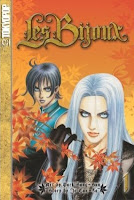 Les Bijoux, Volumes 1-5 written by Jo Eun-ha and illustrated by Park Sang-sun. I really liked the conceit that the characters and their personalities and powers were based on various precious stones. I also liked that the main character changes between genders, although I don’t think it was handled as well as it could be. I get the impression that the series had to end earlier than the creators intended; it shows as they have to cram too much plot into the final volumes. Had they been given the chance to thoroughly explore their world and characters, I think Les Bijoux could have been great. As it is, the narrative is too choppy and requires the reader to fill in too many blanks. I did like the art though, and the men are very, very pretty.
Les Bijoux, Volumes 1-5 written by Jo Eun-ha and illustrated by Park Sang-sun. I really liked the conceit that the characters and their personalities and powers were based on various precious stones. I also liked that the main character changes between genders, although I don’t think it was handled as well as it could be. I get the impression that the series had to end earlier than the creators intended; it shows as they have to cram too much plot into the final volumes. Had they been given the chance to thoroughly explore their world and characters, I think Les Bijoux could have been great. As it is, the narrative is too choppy and requires the reader to fill in too many blanks. I did like the art though, and the men are very, very pretty.
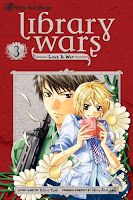 Library Wars, Volumes 3-6 by Kiiro Yumi. I really wish this series was better than it actually is. I do still like it, though. Dojo by far is my favorite character. We get to see a bit more of his backstory in these volumes, which made me happy. It’s been obvious to readers (and to most of the other characters) since the beginning that he’s Iku’s prince although she hasn’t realized it yet. I’m starting to warm up to Iku a little, but it frustrates me that her passion often makes her look so damned incompetent. Her constant need to be rescued by Dojo makes for extremely repetitive scenes which is unfortunate. Although, it does mean Dojo gets more appearances which I’m always okay with. I’d really like to read the original light novels.
Library Wars, Volumes 3-6 by Kiiro Yumi. I really wish this series was better than it actually is. I do still like it, though. Dojo by far is my favorite character. We get to see a bit more of his backstory in these volumes, which made me happy. It’s been obvious to readers (and to most of the other characters) since the beginning that he’s Iku’s prince although she hasn’t realized it yet. I’m starting to warm up to Iku a little, but it frustrates me that her passion often makes her look so damned incompetent. Her constant need to be rescued by Dojo makes for extremely repetitive scenes which is unfortunate. Although, it does mean Dojo gets more appearances which I’m always okay with. I’d really like to read the original light novels.
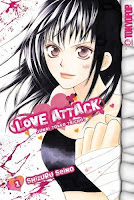 Love Attack, Volumes 1-2 by Shizuru Seino. Chiemi’s about to be expelled for fighting when her teacher makes a deal with her. If she can get her classmate Hirata to shape up, her record will be cleared. One flying kick to the face later, he’s in love and the two become the scariest couple in school. It’s the first serious relationship either of them have been in, and they are delightfully awkward with each other. I loved the first volume of Love Attack but didn’t like the second one nearly as well. The second volume was very silly and, while entertaining, the tone of the story just changed too much for me. The series is up to thirteen volumes in Japan and is still ongoing; Tokyopop managed to publish the first six.
Love Attack, Volumes 1-2 by Shizuru Seino. Chiemi’s about to be expelled for fighting when her teacher makes a deal with her. If she can get her classmate Hirata to shape up, her record will be cleared. One flying kick to the face later, he’s in love and the two become the scariest couple in school. It’s the first serious relationship either of them have been in, and they are delightfully awkward with each other. I loved the first volume of Love Attack but didn’t like the second one nearly as well. The second volume was very silly and, while entertaining, the tone of the story just changed too much for me. The series is up to thirteen volumes in Japan and is still ongoing; Tokyopop managed to publish the first six.
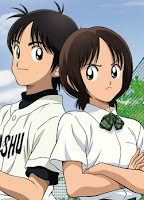 Cross Game, Episodes 23-50 directed by Osamu Sekita. Even though I don’t really consider myself a fan of basball, I got incredibly caught up in and anxious over the games in Cross Game. I think I may have even cheered out loud on several occasions. The series keeps you guessing right up until the end whether or not the team will make it to Kōshien. I could honestly see the story going either way. Despite the palpable intensity of many of the baseball games, Cross Game is not a fast paced anime by any means. The plot and character development is slow and deliberate and yet it remains engaging throughout. The series is very good. Even if you’re not a sports fan, I’d still recommend giving it a try.
Cross Game, Episodes 23-50 directed by Osamu Sekita. Even though I don’t really consider myself a fan of basball, I got incredibly caught up in and anxious over the games in Cross Game. I think I may have even cheered out loud on several occasions. The series keeps you guessing right up until the end whether or not the team will make it to Kōshien. I could honestly see the story going either way. Despite the palpable intensity of many of the baseball games, Cross Game is not a fast paced anime by any means. The plot and character development is slow and deliberate and yet it remains engaging throughout. The series is very good. Even if you’re not a sports fan, I’d still recommend giving it a try.
 Howl’s Moving Castle directed by Hayao Miyazaki. Howl’s Moving Castle is loosely based on a novel of the same name by Diana Wynne Jones. Sophie has been cursed by the Witch of the Waste—although a young woman, she now appears to be ninety—and must seek the aid of the Wizard Howl to break it. While the basic premise, plot, and characters are very similar, Miyazaki takes the story in a very different direction. One of the most noticeable changes is the emphasis given to the war in Miyazaki’s version (he’s not very subtle about it at all.) Howl’s Moving Castle is nowhere near my favorite film by Miyazaki, but I still found it to be enjoyable. I particularly liked the look and feel given to the castle itself.
Howl’s Moving Castle directed by Hayao Miyazaki. Howl’s Moving Castle is loosely based on a novel of the same name by Diana Wynne Jones. Sophie has been cursed by the Witch of the Waste—although a young woman, she now appears to be ninety—and must seek the aid of the Wizard Howl to break it. While the basic premise, plot, and characters are very similar, Miyazaki takes the story in a very different direction. One of the most noticeable changes is the emphasis given to the war in Miyazaki’s version (he’s not very subtle about it at all.) Howl’s Moving Castle is nowhere near my favorite film by Miyazaki, but I still found it to be enjoyable. I particularly liked the look and feel given to the castle itself.
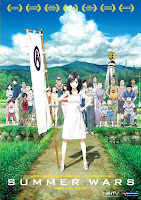 Summer Wars directed by Mamoru Hosoda. I enjoyed Summer Wars immensely and am not at all surprised by the number of awards it has received. It has a great soundtrack, too. The Jinnouchi family is fantastic. Sure, there’s plenty of conflict, but they care for each other and are able to pull together when they need to. They all have distinct personalities, but good luck keeping everyone straight (there’s a lot of them.)While the anime’s not always very realistic, I didn’t really care and was thoroughly entertained. On the other hand, some of the problems caused by what basically amounts to “breaking the Internet” are very real. Visually, Summer Wars is a feast; it just looks great. The differences in style between the OZ network and real life are handled especially well.
Summer Wars directed by Mamoru Hosoda. I enjoyed Summer Wars immensely and am not at all surprised by the number of awards it has received. It has a great soundtrack, too. The Jinnouchi family is fantastic. Sure, there’s plenty of conflict, but they care for each other and are able to pull together when they need to. They all have distinct personalities, but good luck keeping everyone straight (there’s a lot of them.)While the anime’s not always very realistic, I didn’t really care and was thoroughly entertained. On the other hand, some of the problems caused by what basically amounts to “breaking the Internet” are very real. Visually, Summer Wars is a feast; it just looks great. The differences in style between the OZ network and real life are handled especially well.

Speak Your Mind